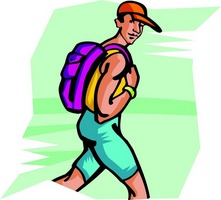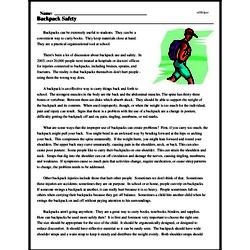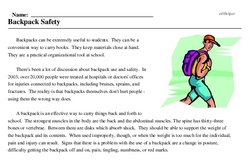Backpack Safety
Backpacks can be extremely useful to students. They can be a convenient way to carry books. They keep materials close at hand. They are a practical organizational tool at school.
There's been a lot of discussion about backpack use and safety. In 2003, over 20,000 people were treated at hospitals or doctors' offices for injuries connected to backpacks, including bruises, sprains, and fractures. The reality is that backpacks themselves don't hurt people - using them the wrong way does.
A backpack is an effective way to carry things back and forth to school. The strongest muscles in the body are the back and the abdominal muscles. The spine has thirty-three bones or vertebrae. Between them are disks which absorb shock. They should be able to support the weight of the backpack and its contents. When used improperly, though, or when the weight is too much for the individual, pain and injury can result. Signs that there is a problem with the use of a backpack are a change in posture, difficulty getting the backpack off and on, pain, tingling, numbness, or red marks.
What are some ways that the improper use of backpacks can create problems? First, if you carry too much, the backpack might pull your back. You might bend in an awkward way by bending forward at the hips or arching your back. This compresses the spine unnaturally. If the weight hurts, you might lean forward and round your shoulders. The upper back may curve unnaturally, causing pain in the shoulders, neck, or back. This can also cause poor posture. Some people like to carry their backpacks on one shoulder. This can strain the shoulders and neck. Straps that dig into the shoulder can cut off circulation and damage the nerves, causing tingling, numbness, and weakness. If symptoms cause so much pain that activities change, require medication, or cause sleep patterns to change, the problem needs to be addressed.
Other backpack injuries include those that hurt other people. Sometimes we don't think of that. Sometimes these injuries are accidents; sometimes they are on purpose. In school or at home, people can trip on backpacks. If someone swings a backpack at another, it can really hurt because it is so heavy. People sometimes fall on others when carrying their backpacks because they get off balance. Sometimes a child hits another child when he swings the backpack on and off without paying attention to his surroundings.




